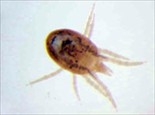Need assistance? Call 800.996.4402

Chicken mites, also known as bird mites, get their common name because they live on the skin of a wide variety of birds, but especially chickens. They become structural pests when they migrate from bird nests into buildings and attack humans. They are found throughout the United States and worldwide.
Chicken mites feed primarily at night, after which the mite drops off of the host.
Chicken mites have been implicated in the transmission of St. Louis encephalitis, but their role in the transmission of the disease is not known. Chicken mites can cause painful skin irritation on humans.
Chicken mites most often live and feed on pigeons, sparrows, starlings and chickens. Chicken mites often migrate indoors from an abandoned nest. They enter through window frames or attics. Chicken mites can also be introduced via pet birds such as canaries or on gerbils from pet stores where an infestation has occurred.
Looking to get rid of bird mites or chicken mites? If you own or handle birds, keep the coops and bedding clean and inspect the flock regularly for signs of an infestation. Do not handle bird nests on your property, even after the birds have vacated the nest. If you have pets that spend time outdoors, inspect them regularly as they can become chicken mite carriers. Inspect second-hand furniture carefully before bringing indoors, as mites can be transported in bedding, furniture, and carpeting. If you see signs of a chicken mite infestation in your home, contact a bird mite control professional to identify the source – often a bird’s nest in or near your home – and treat the infestation. If you have an infestation, launder bedding and clothing in hot water. Consult with a physician for proper treatment of chicken mite bites.
For the very best food safety consulting, auditing and training, please visit our strategic partner, CFS Food Safety